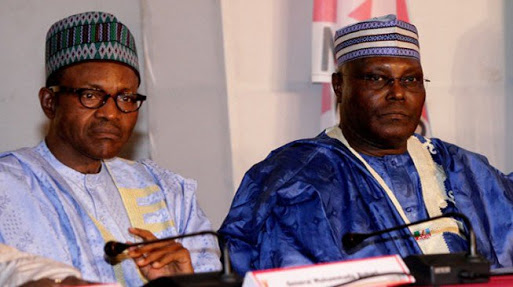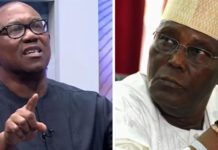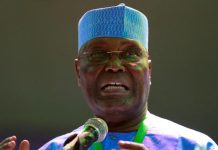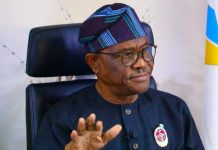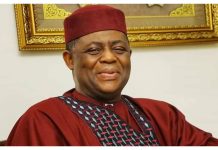You know a democracy is in trouble when two out of three voters don’t bother to turn up for a presidential election. In Nigeria’s just-concluded presidential poll, incumbent Muhammadu Buhari was re-elected with the backing of 15.2 million voters compared to the 11.3 million votes his main rival Atiku Abubakar, was able to amass.
Although this gave Buhari 56% of the total votes cast, in a country with a population of close to 200 million, including more than 84 million registered voters, 15.2 million votes hardly qualifies as a huge mandate. The 35% voter turnout was down from 44% in the 2015 presidential election and way down from the 54% turnout in 2011. In fact, turnout for Nigerian presidential elections has been dropping at an alarmingly consistent rate since 2003. So why are increasingly fewer Nigerians feeling the need to vote in elections that decide the most powerful political office?
Poor organisation is one reason. The last three elections were all postponed at the last minute, causing frustration as well as suspicion that politicians were delaying things to perfect their rigging strategies. Voting itself often involves waiting long hours, in a cumbersome and inefficient process. For some, it’s too much hassle.
Nigeria election: ‘Mr Honesty’ tainted by failure to tackle corruption
Read more
Then there is the ever-present fear of violence on election day. Indeed, violence erupted in several places across the country in this election. Politics is a high-stakes game anywhere; in Nigeria the rewards of victory are particularly high. Nigerian legislators are among the highest paid in the world, while the president controls a huge oil-money fuelled patronage system that can transform you into a billionaire overnight. Also, top Nigerian officeholders enjoy the highest prestige within society because they have money and power. Suffice it to say, the motivation to win is significant. Considering that the Nigerian state is too weak to have a monopoly on violence, some political actors take advantage of this and deploy it as a tool for competitive advantage.
Muhammadu Buhari
Facebook Twitter Pinterest
‘The 76-year-old Muhammadu Buharii who governed highhandedly and often incompetently.’ Photograph: Reuters
Furthermore, this year’s choice between the 76-year-old Buhari, who governed highhandedly and often incompetently during his first term, and the 72-year-old veteran politician Atiku, who is widely considered corrupt, was hardly inspiring.
Advertisement
However, it is likely that the largest contributing factor to the extremely low turnout was the feeling that whoever won, nothing would change. The system is so corrupt that it makes no difference whether X or Y is president. Pew Research conducted last year showed that only 39% of Nigerians were satisfied with their democracy, 72% said most politicians were corrupt and 57% said no matter who wins elections, things do not change much. Only 38% felt that elected officials cared what “ordinary people think”.
And so here we are. The problem is that it is difficult for a system to maintain its legitimacy if only one in three citizens believe in it. This is the position Nigerian democracy now finds itself in. Buhari thus needs to keep his celebrations as short as possible and start focusing on restoring some faith in the system. A genuine and systematic effort to tackle corruption, including within his party, would be a good start. While having built a reputation of not being personally corrupt, during his first term Buhari was seen by many to have pursued a selective anti-corruption drive aimed solely at opposition politicians, while his own political friends conducted business as usual.
Atiku Abubakar
Facebook Twitter Pinterest
‘The 72-year-old veteran politician Atiku Abubakar, who is widely considered corrupt.’ Photograph: Reuters
For instance, one of Buhari’s main political allies, former Lagos state governor, Bola Tinubu, was flippantly unapologetic about the bullion vans, which many suspected were full of cash for vote-buying, photographed entering his premises on election eve. He said he reserved the right to give people cash “free of charge” if he so wished while denying that it was to buy votes. Incidents like this only fuel the cynicism of Nigerians, who see Buhari as hypocritical for turning a blind eye to such brazenness from his allies.
He also needs to make his second-term cabinet as diverse and competent as possible. Voter turnout was particularly low in the southern states where Buhari, who hails from the north, is seen by many to favour his kinsmen and those loyal to him in political appointments while competence takes low priority. Nigeria’s economy has taken a battering in recent years and it is vital that people see Buhari as putting the welfare of the country’s economy and its citizens above any personal or ethnic considerations and sentiments.
Like a marriage, democracy cannot survive without trust. The relationship between the Nigerian government and its people is broken. Apathy prevails. Trust is scarce. Buhari’s second term needs to be focused on tackling this lack of trust that Nigerians increasingly feel towards their political system. Otherwise, the future of Nigerian democracy looks very bleak indeed.


